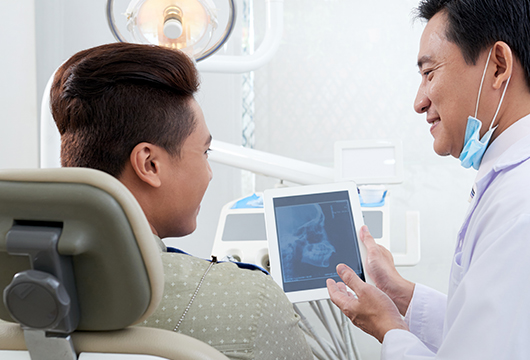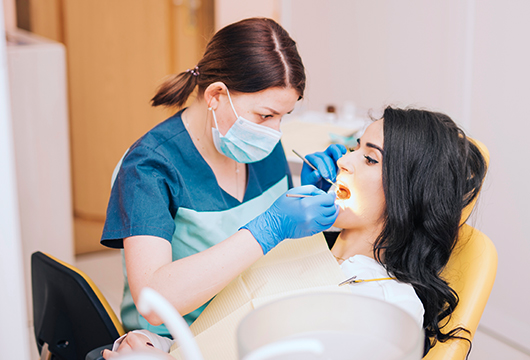Wisdom Teeth Removal
in Balcatta


A Comfortable Experience for Wisdom Tooth Removal
Extracting wisdom teeth can be an unpleasant experience, and it’s essential to make sure the wound heals so that you don’t get an infection.
Emerging wisdom teeth can be painful and may cause discomforting signs such as swelling and trouble chewing. However, you may also be worried about the surgery, or you’re not sure what to expect during the procedure.
Wisdom tooth removal is one of the standard dental procedures. It is done to extract the last set of teeth at the back of your mouth to prevent tooth damage. The procedure can be done in the dental clinic or hospital using anaesthesia.
Comfort Care Dental is here to help make your experience as comfortable as possible. Our team of experienced professionals will take care of you every step of the way, from pre-surgery consultation to post-operative care.
Dental Problems that Might Need Wisdom Teeth Removal


Overcrowding
Wisdom tooth needs space when they erupt. But, sometimes, the mouth is already crowded with teeth. It may cause the adjacent teeth to shift and result in misalignment. Hence, wisdom tooth removal is done.

Risk of Tooth Damage
Wisdom teeth are the last teeth to come out and usually don't have enough space to come through normally. Related to overcrowding, this can lead to an impacted tooth, which may push the other teeth, causing damage due to a high risk of decay and compromised oral health.

Tooth Pain and Infection
If you are experiencing pressure pain in your jaw or gum swelling, you are likely experiencing wisdom tooth eruption. A partially erupted wisdom tooth may be at high risk of infection. Food debris and plaque can get trapped between wisdom teeth and gums and accumulate bacteria. Our dentists can help to relieve the pain and protect your oral health.

Impacted tooth
Dental hygiene may be compromised by pain from an impacted wisdom tooth. Because of the overcrowding and lack of space, proper brushing, flossing, and cleaning of your teeth become difficult. When this happens, your dentist may recommend a wisdom tooth extraction.
Why Choose Comfort Care Dental

Modern Technology
We make it a priority to stay on top of the latest information about dentistry that will help us perform wisdom tooth removal more efficiently. We believe that we can provide quality dental care for our patients if we continue to employ advanced technology.

Experienced Dental Team
It is important to stay up-to-date on the latest information about wisdom teeth removal. Our dentists make it their priority too! It is our duty to make sure your oral health is in good shape. So, we work hard to provide a safe tooth extraction to keep your healthy teeth from potential damage.

Relaxed Environment
As a patient, you'll be greeted with warmth and professionalism by our officers and dentists. We know that building relationship is the key to making sure your visit goes smoothly.

Flexible Payment Plan
We want you to get the treatment that is best suited to your needs without financial barriers. We offer convenient payment methods like Afterpay and Humm, which allow you to settle payments in instalments.
We Accept
All Payments and Healthfunds
Comfort Care Dental is a trusted dental practise in Balcatta. We offer flexible payment options and accept all major health funds.
We understand that dental services can be costly. Hence, we provide financing alternatives to make receiving oral care more accessible for everyone! We partnered with the most popular buy-now-pay-later options like Humm and Afterpay to make quality dental care morer accessible to everyone.
We are also a preferred provider for HBF, MBP, HCF, NIB, and CBHS.
Frequently Asked Questions (FAQ’s)
What Are the Benefits of Wisdom Teeth Removal?
- Prevent Teeth Shifting
In some cases, wisdom teeth can erupt at an awkward angle and try to squeeze in to make a room. The problem is that it becomes impacted due to lack of space and causes pressure pain as your other teeth shift position. Crowding usually makes the teeth prone to cavities, chipping, and misalignment. Hence, performing wisdom tooth removal can keep your teeth and gums healthy. - Preventing Infection or Tooth Decay
When you keep your problematic wisdom teeth, some areas become difficult to clean, making food debris trapped and attracting bacteria. This can cause a high risk of infection and tooth decay. Removing an impacted wisdom tooth can prevent the creation of spaces that accumulate bacteria. - Reduce Risk of Gum Problems
A partially erupted wisdom tooth may cause the gums to swell and become inflamed due to the pressure of pushing other teeth to make room. Also, plaque buildup around the area can be a problem for your gums too. This issue may lead to more advanced oral infections, gum recession, or even gum disease. - Alleviate Severe Pain
One of the most common reasons why patients choose to remove their wisdom teeth is to reduce the discomfort they’re experiencing. Developing these third molars can cause difficulty chewing and brushing your teeth in certain areas, and the pain may radiate across the jaw. However, most dentists may recommend observing the signs and symptoms for a while since the toothache may subside but potentially come back from time to time.
What to Expect During the Wisdom Teeth Removal Process?
- Numbing the area.
Before the procedure, the dental team will make sure you’re comfortable. Your dentist will administer anaesthesia to you to numb the area. - Gaining access to the wisdom tooth.
The process of gaining access to the wisdom tooth will depend on your case. If it’s still underneath the gums, the dentist will make an incision in the gum lines to expose the bones and tooth. Then, some parts of the bones will be carefully removed to access the tooth roots. - Extracting the wisdom tooth.
Depending on the tooth’s position, the dentist will divide them into sections to pull them. This will make them easier to remove and have less impact on the roots and gums. - Cleaning the area.
After the tooth has been removed, the dentist will clean the area thoroughly. It is an essential process to ensure that no debris or bone fragments are left behind. Otherwise, such remains can be harmful to the open wound. - Inserting stitches.
To promote the healing process, stitches may be applied at the extraction site. They will also keep food and bacteria from getting into the hole, so it doesn’t get infected. - Applying gauze.
Once the dentist has performed your wisdom tooth removal procedure, they will ask you to bite down on a piece of gauze placed over the wound. This will help reduce blood loss, form clots, and promote healing.
What Happens if I Don't Remove My Wisdom Teeth?
Many people get their wisdom teeth removed because they cause problems such as discomfort or pain. But there’s no rule saying you have to remove them, especially if there’s adequate space, and some choose removal even though it doesn’t affect their health to avoid complications later on down the line.
Here’s the list of possible complications with wisdom teeth:
- Oral infection.
When your wisdom teeth finally emerge, they can get stuck below the gums’ surface and grow at the wrong angle. This issue can create spaces where food can get trapped in the gum tissue and lead to an oral infection. - Tooth pain.
The pain in the back of your mouth can be a sign that wisdom teeth are coming in. Pain may start as mild and then become more severe over time, making it difficult to chew or talk, resulting from a tooth pressing the nerves in the mouth. - Wisdom tooth impaction.
When there is insufficient space to accommodate the wisdom teeth, they can become impacted.can cause severe pain and other complications, affecting your oral health when this happens. Other signs of an impacted tooth are pain, swelling, and redness of the gums, but no signs of developing a tooth. - Cavities.
Difficult areas to clean can make the teeth more prone to decay, which can lead to cavities in the long run. - Teeth are shifting.
Teeth may shift and become misaligned when wisdom teeth emerge without enough room in your mouth for them.
Is Wisdom Teeth Removal a Safe and Painless Process?
Wisdom tooth removal is one of the most common procedures done by dental professionals. With today’s technology, updated information, and studying patients’ cases, they can perform it safely.
It would be wrong to say that wisdom tooth removal is painless. Like with any other medical procedure, side effects are possible after the process. But during the treatment, your dentist will make their best effort to ensure your safety and that you’re comfortable. The dental team does this by administering anaesthesia; it numbs the area to make sure you don’t feel any pain during the removal. You may expect to feel some pressure when pulling the tooth, but that’s it.
After the extraction, some mild discomfort is expected. But the dentist will give you aftercare instructions for your recovery.
What Are the Risks of Wisdom Teeth Removal Procedure?
While most cases of wisdom tooth removal don’t result in long-term complications, several possible risks may occur following the procedure.
A “dry socket” is a serious issue that can occur after tooth extractions. The blood clot that protects the nerves and bone tissues in this extraction area becomes dislodged or dissolved. This problem can leave the wound open and delay the healing process.
Your dentist will do their best to prevent and minimise such concerns. But knowing the potential risks may be essential:
- Damage to nearby teeth, nerves, sinuses, and the jawbone.
- Excessive bleeding.
- Bacteria and food particles cause infection of the tooth socket.
- The loss of a blood clot causes bone exposure.
- Dry socket or ruptured blood clot.
- Numbing of the lips.
- Temporary discomfort or restricted muscles from opening the mouth.
What Should I Look out For After Getting My Wisdom Teeth Removed?
Most wisdom tooth extractions don’t cause significant complications. However, if you start experiencing any of the following signs, you should contact your dentist right away:
- A high fever of 100.4 degrees Fahrenheit.
- Pus is coming out of the extraction site.
- Heavy bleeding.
- Persistent pain that does not subside, even with medications.
- Numbness of your face or jaws.
- Difficulty breathing.
- Difficulty swallowing.
How Do I Take Care of My Extraction Site After Wisdom Teeth Removal?
Some patients experience mild to no pain after surgery. Swelling and discomfort are common reactions following the extraction. It is important to follow the dentist’s advice when recovering from wisdom tooth removal. Here are some tips for your first few days following a procedure:
Dos:
- Drink plenty of water to keep your body hydrated.
- Let your body rest, especially during the first day. Halting from strenuous activities will help you preserve energy for a speedy recovery.
- Consider eating soft foods to avoid hurting the affected area.
- Take your dentist’s medication if you experience pain or swelling.
- If you want to keep your mouth clean, try rinsing it with warm salt water after every meal. This will help get rid of any food particles and reduce swelling.
Dont’s:
- Avoid drinking from straws.
Make sure not to rinse your mouth vigorously. - You may want to take a break from eating hard, crunchy, and sticky foods.
- Smoking has been shown to slow the healing process and should be avoided.
- For the first few days, avoid sugary, caffeinated, carbonated, or alcoholic beverages.
Can I Have All My Wisdom Teeth Removed at The Same Time?
Yes. Most dental professionals recommend having all four wisdom teeth removed (if necessary) simultaneously. However, it may take a couple of dental appointments to complete the procedure, but it is less expensive than having to remove each of your wisdom teeth separately.
To get the best results, you should first let our dentist assess your wisdom teeth so that they can come up with a proper treatment plan for your condition.
How Much Do Wisdom Teeth Removal Cost?
The cost of having wisdom teeth removed varies depending on factors such as the severity of the case (position of the tooth), type of anaesthesia used, and the number of wisdom teeth.
In Australia, a simple wisdom teeth extraction’s estimated cost may range from $250 to $400. Meanwhile, the fee for extracting an impacted wisdom tooth is between $450 to $600.
If you need to remove all four wisdom teeth under local anaesthesia, it may cost $2,322, according to the National Dental Fee Survey.
Factors Affecting the Cost of Wisdom Teeth Removal
- The number of wisdom teeth that requires extraction.
Maybe it seems like the cost of removing all your wisdom teeth at once would be more expensive. But in reality, it can save you money because you will only need to pay the anaesthetist once. - The complexity of the procedure.
More invasive tooth extractions such as using general anaesthesia and removing an impacted wisdom tooth cost more than simple methods. - Dental fee.
The dentist’s fee also affects the actual cost of wisdom teeth removal. There are recommended standard fees for a wide range of procedures produced by the Australian Dental Association. However, wisdom tooth extractions are not included. Hence, specialists or oral surgeons typically charge more than regular dentists.
